Movers and shakers from the world of Bollywood, politics, business, art, sports, writing, music and myriad other fields talk about the turning points in their lives
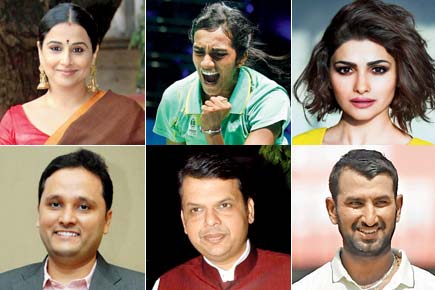
Vidya Balan, Actress
ADVERTISEMENT
'Madhuri and her dancing was the trigger'
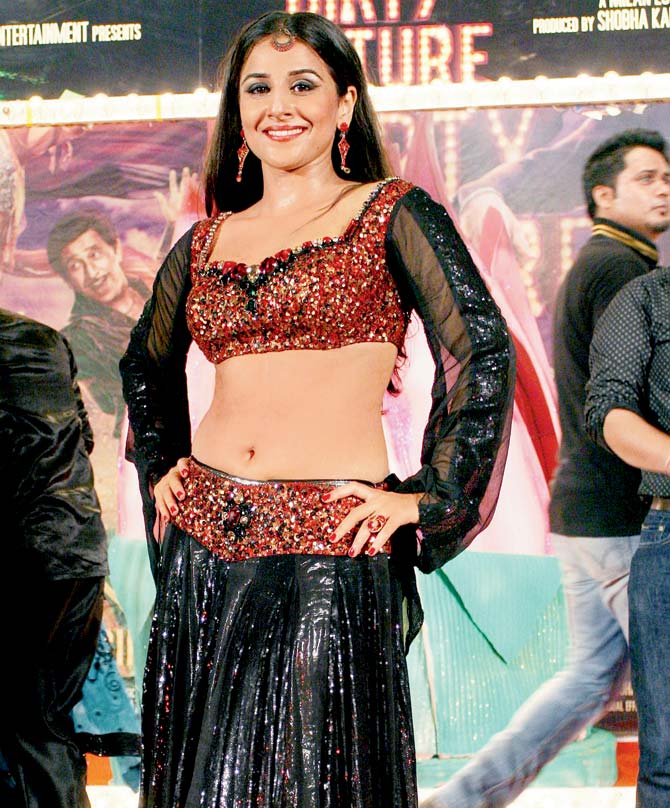
I was about 11 when I first watched Madhuri Dixit dance her iconic number, Ek Do Teen, in Tezaab. I consider this a trigger
point that made me interested in movies. The acting bug had bit me. In the years that followed, during my growing up years, I
carefully watched actors' performances and tried to imbibe the things I liked. My sister, Priya, would constantly tell me that
acting wasn't just about having a pretty face and a good body. It's what you do with it. It is how you use it to convey what you are thinking, feeling and going through.
Of course, over time, my understanding of acting changed and evolved, but at a basic level, I think the one factor that has,
and still remains, is my interest in people and their life stories. It is the chance to relate to their tales or alter them.
Or perhaps, imagine how changing a little bit in someone's life can change their life altogether. This is probably most
evident in my choosing a film like The Dirty Picture (2011). The South sex siren, Silk Smitha, is far removed from the person
I am. I wanted to know what and how feels. I could only do that by living her.
- Shaheen Parkar
Devendra Fadnavis, CM of Maharashtra
'Mr Modi told me to clean up corrupt politics and administration'
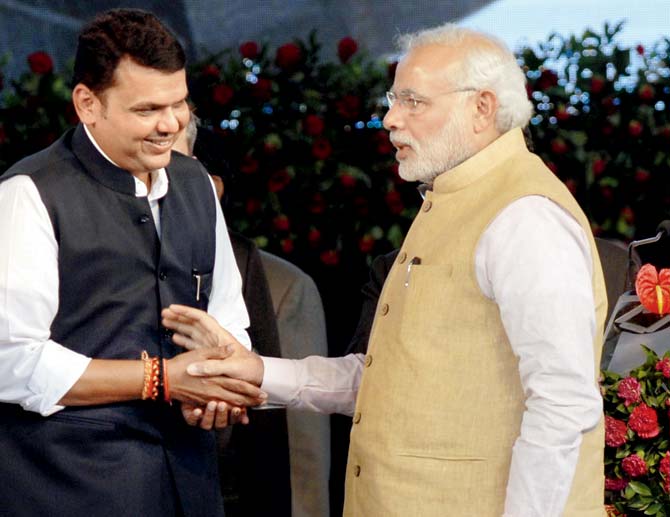
My father, Gangadharrao, was a member of the state legislative council. I had thought of stepping into his shoes at some
point, but wanted to also get a law degree. I wanted to get the degree from England and settle my law practice in my hometown, Nagpur. I even took admission at Nagpur's Law College. However, my father's untimely death disturbed our family. But my mother stood by us all and made us successful in our lives.
In 2014, I was the president of the state BJP. It was a dream-come-true for the party when we won the Assembly polls. The
results were out. The party was some seats short of majority and yet it was headed to make its first ever government in
Maharashtra. But who would be BJP's first Maharashtra CM? That was the big question.
I believe I made it to the top job primarily because I was the state BJP chief at the time. I'm immensely proud to say that my
seat-wise forecast for both the Lok Sabha and Assembly proved right, especially at a time when few people thought we would win such big numbers. I got an inkling that the high command had considered my name, among others, for the CM's post.
I got a call from Mr [Narendra] Modi's office before the leader of the legislative party was elected. When I met Mr Modi he
told me that the party was considering me for the CM's post. He told me clearly that a proper process would decide the CM,
whoever that may be. But, he was specific in telling me that, if chosen, he would want me to clean up corrupt politics and
administration in Maharashtra. And that became my aim when my name was announced.
- Dharmendra Jore
Manoj Bajpai, National Award-winning actor
'Shekhar Kapur told me to earn money'
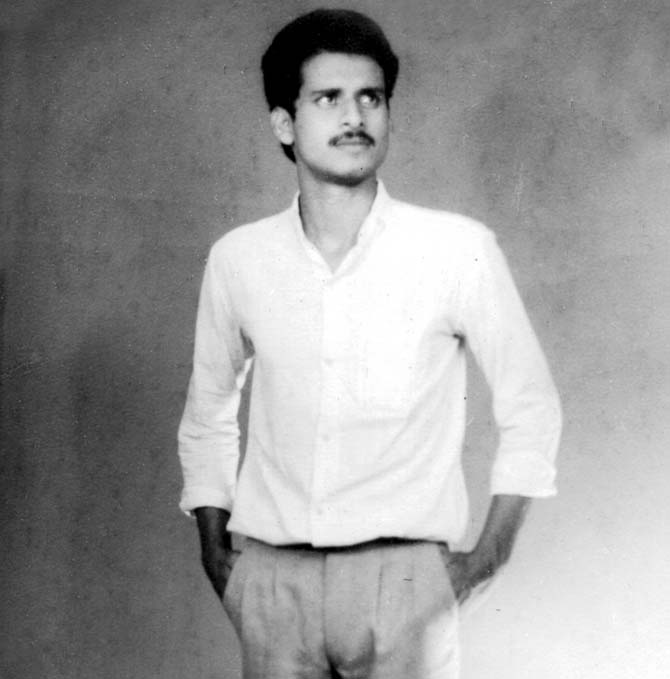
(Above and below) Manoj Bajpai during his theatre days in Delhi
I was in awe of Bachchanji (Amitabh Bachchan) after watching Zanjeer. It was that moment that I decided to become an actor.
And so, during my college days, I started doing theatre. I wanted to join the National School of Drama, but couldn't. So I
attended workshops conducted by the Sambhav Theatre Group for almost a year. I would still keep trying to break into NSD, but
I reckon it wasn't destined. So, a friend, NK Sharma, and I started our own theatre company.
It was in 1992 that something that filmmaker Shekhar Kapur said changed my life. He told me to head to Mumbai and try my hand at films. He said that though theatre would satisfy me creatively, I would need the money for when I had a family. And so, I decided to take the plunge. Once in Mumbai, I started my struggle. It was tough since I didn't know anyone. Luckily, I got
cast in Kapur's Bandit Queen (1994) as a dacoit.
I had auditioned for the lead role, which ultimately went to Nirmal Pandey.
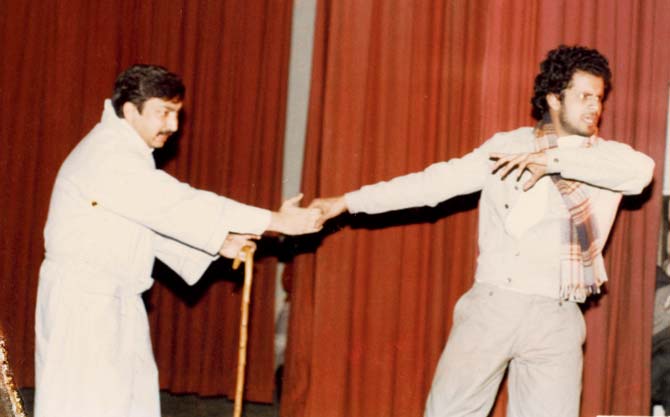
After Satya (1996) released, there was no looking back, until a few year ago when I injured myself. For two years, I had to
lay low and read false media reports about me. Everyone had written me off and I lost many projects. I was down to my last
penny. And then Prakash Jha offered me Rajneeti, and subsequently, Aarkshan. It was the most challenging phase of my life, but
it made me stronger and wiser.
- Shilpi Mahapatra
Narayan Murthy, Icon-Entrepreneur
'I was shocked at how Communists treat friends'
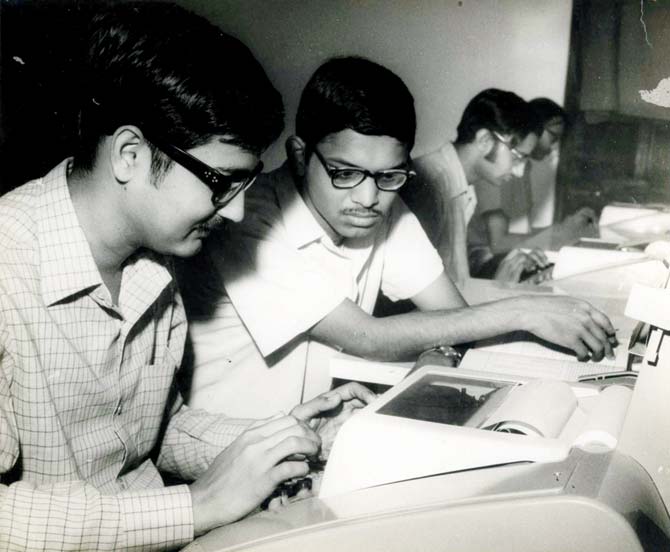
Narayan Murthy (right) in his twenties
I was a Leftist in my student days and strongly influenced by the Nehruvian concept of Socialism. Later on, while I was
working in Paris in my late 20s, I realised that the only way to combat poverty was to create jobs. I decided to return to
India and conduct an experiment in entrepreneurship. I hitchhiked from Paris to Mysore when I was 27. I was on the road for 11
months. During that time, I was on a train from Nis in Serbia to Sofia in Bulgaria. I started talking to a girl in French. The
boy next to her, who did not understand the language, thought I was perhaps plotting against the state. He called the police.
The police incarcerated me in a room in the railway station without food or water for 72 hours. They finally put me on a
freight train going to Istanbul. They said they were being kind to me because I was from a 'friendly' country. I was shocked
that the Communist system treats friends like this. My disenchantment with Leftist/Communism began that day. I embraced what I call 'Compassionate Capitalism'.
The most frequently asked question I face, especially when talking to young people, is about what makes an entrepreneur. I
believe an entrepreneur must have an idea whose value to the market can be expressed in a simple sentence, not a complex or
compound sentence. He or she must ascertain that the market is ready for the idea and it is decent-sized market. Must have a
team with complementary strengths, and, finally, an enduring value system.
- Hemal Ashar
Tasneem Mehta, director, Dr Bhau Daji Lad Museum
'My desire for excellence reflects in my daughters'
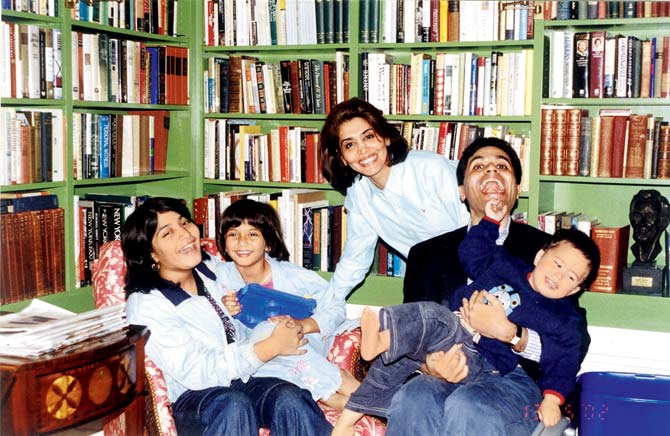
Tasneem Zakaria Mehta (centre) with her brother Fareed, his son, and her two daughters Malika and Ahilya
My journey with the 144-year-old Bhau Daji Lad Museum has been nothing less than a love affair. But, my affair with art and
heritage began much earlier and all because of one person, the Late Mrs Pupul Jayakar, the founder of the Indian Trust for Art
and Cultural Heritage, INTACH. I was always into arts but she gave me the direction I needed. Back in 1994, when I had just
come back from London after doing my Diploma in Art History, I met Mrs Jayakar. All my achievements wouldn't have happened, had I not met her. It was she who asked me to be a part of the governing council of INTACH. I said I was too young, but she insisted. She said age didn't matter, passion did. It made me truly believe in myself.
I learnt perseverance, tolerance and kindness from her. The principles she taught me are applied to what I do at the Bhau Daji
Lad. I also want to mention that wouldn't be where I am without my family's support. My desire for excellence and the approach
of a perfectionist has reflected well on my daughters Malika and Ahilya. They both are studying abroad. My older one, who is
studying public policy at Harvard, is more like me, the activist kind. And my younger one is studying law. I think that says it all.
- Aparna Shukla
Vikas Dilawari, Conservation architect
'I trained with Ved Segan who restored Shimla's Gaiety cinema; it left an impression'
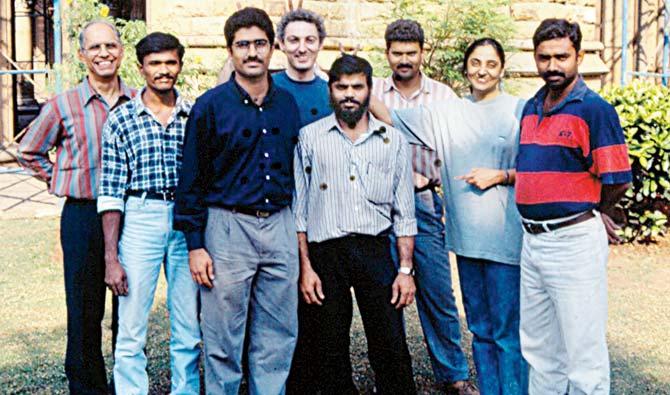
Vikas DilawariâÂu00c2u0080Âu00c2u0088(third from left) with the team while working at the Rajabai Tower
As a student from the suburbs who travelled to SoBo, I would always gaze at its heritage buildings, especially VT (CST)
station. In fact, when I alighted from my bus (84), the sight of Byramjee Jeejebhoy Parsi Charitable Institution, always awed
me. Little did I realise that one day I would be their architect.
In 1991, it was my first project to materialize. I'm still their architect. In 1984-85, as a student of LS Raheja School of
Architecture, I trained with eminent architect Ved Segan (who designed Prithvi Theatre) who was, at the time, restoring
Shimla's Gaiety cinema; it left an impression. In Mumbai, Crawford Market was a part of my college project. Most suggested its
demolition, whereas I took the conservation route. They scored higher marks! Later, while studying at Delhi's School of
Planning and Architecture, I secured a scholarship with INTACH which required me to work on a list of the city's heritage
structures for which I had to verify 300-400 buildings. It was another turning point. By the time I graduated in 1989, I was
the first to use 'conservation architect' exclusively on my letterhead, and it continues. I opted for a job that helped me
teach and work on heritage projects. Those were the early days of heritage conservation and activism. At the start of my
career, a municipal commissioner addressed me as a 'conversation architect!' In 1992, I worked on the Draft Heritage List with
local NGOs that was able to secure Grade I, II and III buildings in the city. The following year, Rahul Mehrotra conducted a
series of seminars which set the mood and motivation among us young architects.
The BSCPA building was my first assignment, while the Army & Navy building in 1995-97 was my first big break. ANZ Grindlays
Bank, Pune's Aga Khan Palace, University building and Rajabai Tower, and the Bhau Daji Lad Museum are cherished projects.
Despite being in an offbeat profession, I followed my heart and was fortunate to work with sensible clients. God has been
kind. The 'junoon' keeps me going.
- Fiona Fernandez
Amish Tripathi, author
'It was all about surrendering to my creative flow'
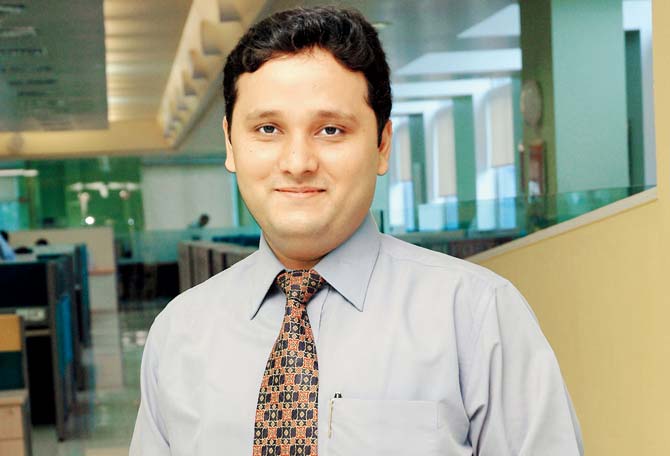
Amish during his IDBI days
II never thought I would be a writer when I was young. In fact, I never even wrote for my school magazine. There were three
major turning points in my life, which gave me the conviction to write full time and quit my finance job. My first book,
Immortals of Meluha, was my first attempt at any kind of fiction. When I started writing, I tried to do it in an organised
manner with character sketches, story summaries, word-targets-per-day etc. And I failed.
That is when my wife suggested rejecting the “organised and controlling” approach and instead simply follow my instincts by
surrendering to the creative flow. She said I should write with humility of a witness and not with the arrogance of a creator.
Her words helped my writing process immensely.
The next high point was the success of Meluha. After being refused by over 20 publishers who said that no one would be
interested in reading mythology, I self-published the book and the response was quite pleasant as it hit the bestseller charts
within a week of launch. Of course, the rejections disappointed me. But I never thought of giving up. The success, however,
gave me the confidence that there are people who want to read what I write. The third important stage was when I decided to
write full time after my second book came out (since by then, the royalty from my books had surpassed my salary). I made this
decision with the encouragement of my elder brother and my wife.
- Dipanjan Sinha
PV Sindhu, Olympic silver medalist
'Winning and losing are both part of life'
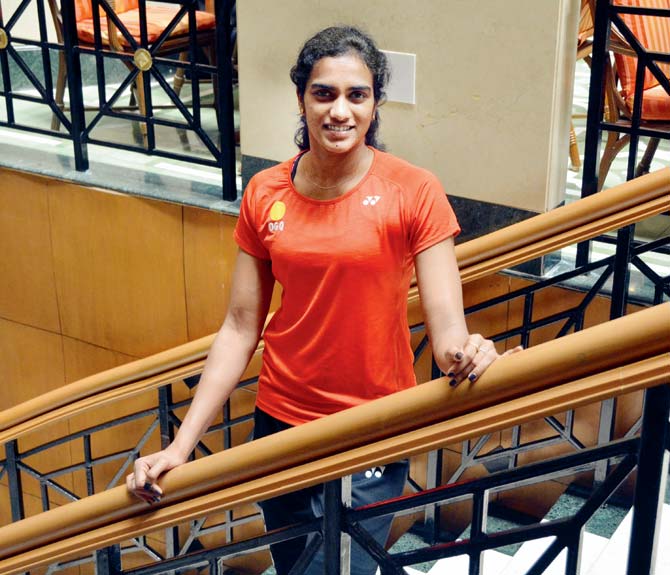
PV Sindhu in Mumbai earlier this year
Winning an Olympic medal is any shuttler's dream and so was mine. Little did I know, I would achieve that feat in my very
first Olympics at Rio -- that too, a silver. Last year, I came back from a foot injury. I was sceptical of recovering in time
for the Olympics. Once I got to know that I would be playing at Rio, I worked hard. Gopi sir (National coach P Gopichand)
motivated me -- he told me to stay off chocolates! I also wasn't allowed to use my phone till the end of the Games. But I took
it in the right spirit and was aptly rewarded.
The turning point of my career was in 2012 when I beat London Olympics gold medallist Li Xuerui of China in the quarters of
the China Masters. That's when the world took note of me and felt I could do better. I went on to become the first Indian
shuttler to win a bronze medal at the Guangzhou World Championships in 2013. From there, my dreams of achieving Olympic glory began.
What I have learned is that consistency is most important in a player's career. Badminton has recently gained a lot of
popularity, not just among the youth, but the older generation as well. Once I started winning titles, my confidence slowly
increased. Every player works hard, but they do not attain success at the same time. Some might achieve it soon, while some
could take time. Gopi Sir and my parents kept my spirits up. Sir taught me that winning and losing are part of life, but
what's important is enjoying the sport. Once I started beating higher-ranked Chinese players, I started to believe in myself.
- Sundari Iyer
Harish Baijal, officer who cracked down on drunk driving
'People would step out of Mumbai's bars drunk and then drive home'
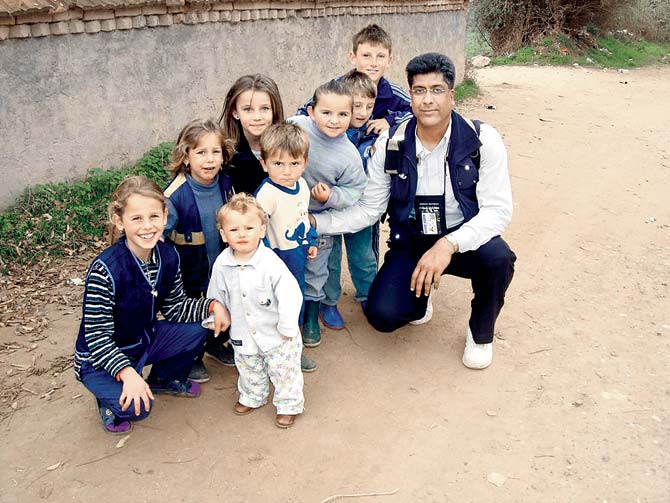
This is a photograph of Baijal during his stint in Kosovo. At the time, Baijal was on the Dancon March — a march-cum-run-cum-walk for 24 miles through rivers, valleys, mountains etc with a 10-kg bag on the back. Baijal had stopped to distribute chocolates to the children of the villages en route
When I joined the Mumbai traffic police as Deputy Commissioner in 2005 I was struck by the number of accidents that one saw
due to drunken driving on the streets here. It reminded me of the time when I was the United Nation's peace-keeping force in
Kosovo. There, if any police officer on deputation was found driving drunk, they were immediately returned to their home
country. Therefore, I became a much-in-demand officer for parties as I did not drink. What I also realised was that because of
the strict laws, there were hardly any fatal accidents in Kosovo as traffic rules were strict and citizens followed it. Not
just that, citizens also did not hesitate from stopping officers who violated traffic rules.
Seeing that people would step out of Mumbai's bars, drunk and not hesitate to drive home, with no fear of imprisonment, it
reminded me of how strict laws kept people safe in the east European nation. I convinced my senior, Joint Commissioner Vijay
Kamble, about the campaign. Eventually, I also started getting on the streets to motivate my staff.
On Wednesdays, Fridays and Saturdays I would hit the bed only at 3 am after taking a review of all the traffic chowkies. The
nakabandis were largely conducted on these days. In the mornings, I would visit the courts where drunk drivers were brought
after being detained at night. I would argue the case so that the offenders would get tough punishment. I joined the police
force because of the reach and impact this job can have. Cellphone companies boast of a large customer base, but as a police
department, the entire city is our customer base and we have to offer and service them.
- Vinay Dalvi
Prachi Desai, actress
'I felt like an exotic animal at a zoo'

The way my career started off was silly. I decided to go for an audition for the fun of it and even lied about my age. I was
16, but since it was a rule to be 18, I said I was. I auditioned for a chick flick set in a college. A few months later, I got
a call asking me to come down and take a look test for a TV show for a 9pm prime slot. I had no idea that I would come to
Mumbai, and then never go back to Pune. That show was Kasamh Se. The day my life changed was the day my character marries Mr Walia (who was played by Ram Kapoor). I was told a night before about this plot development. I was petrified playing a bride at 17, but Ekta Kapoor, and everyone else possible called to pacify me and assured me it was for the good of the show. Our TRPs shot up with that one episode, and we became the number 1 show. The fan mail increased and I knew life changed. It was impossible to step out after that, as people would flock me everywhere. I remember I was in Surat visiting family for Navratri one year and there were people standing on my balcony, trying to get in. That incident scarred me so badly that I never went back to live there. I felt like an exotic animal in a zoo. During my board exams, news channels followed my car till Pune and got pictures of me appearing for the exam. That was unreal and I didn't know how to handle it. Thankfully, I had someone like Ram as a co-actor who would pamper me like a kid. He called me Bunny and it is only because of him, I stayed calm and pulled through the show with such confidence.
- Mohar Basu
Shankar-Ehsaan-Loy, Music composers
'We never imagined doing films together'

Ehsaan (Noorani), Loy (Mendonsa) and I (Shankar Mahadevan) were friends since we worked together in the advertising field.
But we never imagined that the three of us would be doing music for films together. We were doing a Pepsi commercial for Mukul Anand and he offered Ehsaan to do music for his next film, Dus (2005). Ehsaan refused immediately. But when Mukul pushed him, he said he'd do it if Loy and I also do the film. We met Mukul and had the narration. When we reached the studio to record the first song, the makers and people from the industry were all there. They asked Mukul who the composer of the film was and he pointed at us. Everyone was surprised to see three composers. They were shocked that there were no musicians, arrangers and music coordinators, etc. Mukul said these three would do everything. So they told Mukul, “Boss, tumne kisko sign kiya hai!”
They'd completely given up. In the evening, we recorded the first song, Chandni, and they were floored. They offered us the
entire soundtrack!
A few days later, Mukul called me from New York, before we were about to record the most important song of the film, Suno Gaur Se Duniya Waalon. He blessed us, saying, “It's a patriotic number, but I want it to play for every cricket and football match, and even at clubs.” We did the song and the team loved it. But Mukul passed away during the making of the movie and Dus got stalled. We were happy doing jingles, but we were upset that our career in the film industry saw such a low right at the
beginning. It was then that Nitin Manmohan (the producer of Dus), shot a video for Suno Gaur Se to pay tribute to Mukul. The
song took off. It played everywhere, from cricket matches to clubs. Mukul was and has been a guiding force. Later, Vidhu Vinod
Chopra gave us Mission Kashmir and Farhan (Akhtar) gave us Dil Chahta Hai. The rest is history.
- Soumya Vajpayee Tiwari
Vijender Singh, Olympic medal-winning boxer
'My weak arms led me to be a boxer'
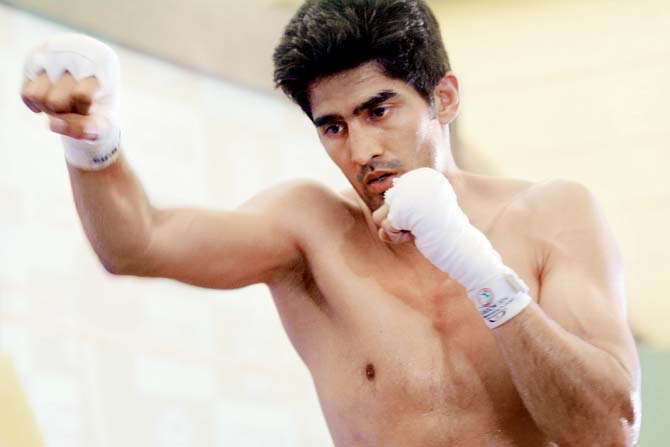
Vijender Singh at an event in Mumbai last year
P eople often compliment my strong arms, but few know that they were not as strong in my younger days. In fact, I am here
today -- as India's most successful professional boxer (having won eight out of eight pro bouts) -- because of my weak arms. I
remember being 13 years old, entering the Bhim Stadium in Haryana to do gymnastics. A couple of guys from my village, Kaluwas, had won local competitions, so many kids wanted to be gymnasts.
On day one of my gymnastics training, I was instructed to do some hand exercises -- the activity required strong hands -- but my arms were weak, so I struggled. I was disappointed, but returned the next day, and then the next, but consistently failed and
even got ridiculed by some for having weak arms. Disappointed, I walked out of the hall, and saw a group of young boxers,
practising shadow boxing (punching the air against an imaginary opponent). I liked the quick punches they threw and decided to
join the group. Immediately, boxing coach Jagdish Singh liked what he saw. He came to me and asked what I was doing there. I
told him that I had come to do gymnastics, but was not interested in it anymore because I couldn't do the hand exercises. He
then asked me if I liked boxing, and I said yes. To this, he said that boxing also involved hand exercises, but I had nothing
to fear because I had naturally quick hands, which are a prerequisite for the sport. He made me work on strengthening my arms
thereafter and the rest, as they say, is history!
- Ashwin Ferro
Mariketty Grana, owner, Thalassa (Goa and Mumbai)
'It hurt me that there were no pita wraps in Goa'
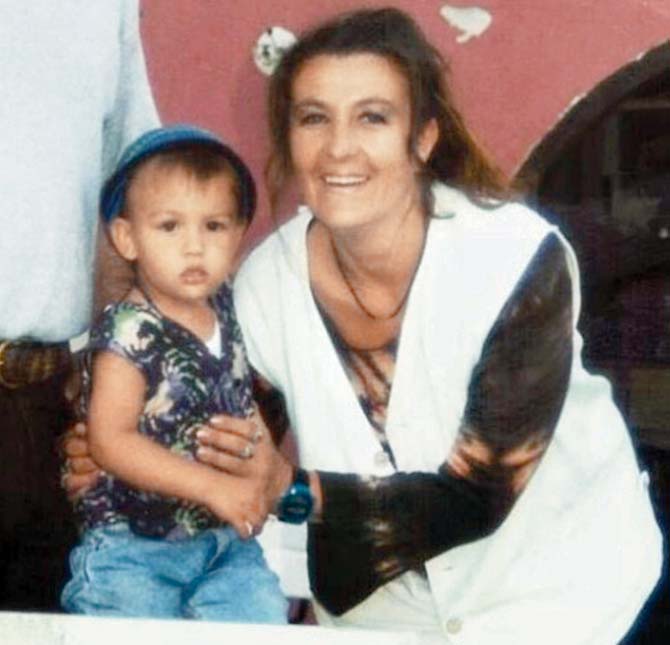
Mariketty Grana with her son, Spiro, during her first days in Goa
I came to India as a backpacker from the Greek island of Corfu around 30 years ago and never left. At a flea market in Goa, I
saw the stalls selling pizzas, pastas and falafels. It hurt me that there were no Greek pita wraps and kebabs there. I decided
to change that. Moreover, the energy of Goa drew me in and cocooned me. One day, I said to myself, “I love it here, the
place, the people... they make me happy, what else matters?” and so I stayed. When I took this decision, my family was worried and tense because they didn't know much about India. It was up to me to make them comfortable with the idea of it. I have always been the strong one who did the unexpected, and was unstoppable once I made up my mind. They knew they couldn't stop me even if they tried. But, setting up Thalassa in Goa was never easy! There were good days and bad days and worse days. When I look back I am amazed at how fearless I was… I never let the fear of failure stop me from trying to do things. The more I did things outside of my comfort zone the more sense of accomplishment I felt. It was such a high! That's how I knew I was on the right path. However, one never feels that they have arrived. At least I never have. One does one's best and everything just falls into place.
- Anju Maskeri
Shilpa Gupta, installation artist
'Being on the edge has worked well for me'
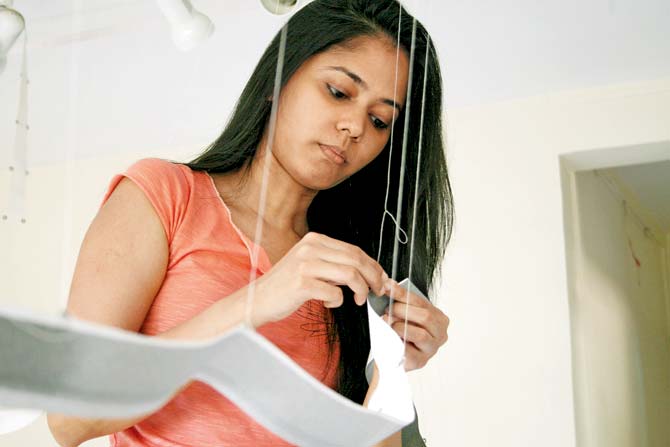
Shilpa Gupta prepares for a solo show in Berlin in 2009. Pic/Shrutti Garg/Shilpa Gupta
Between 2006-2007, I created three interactive video projections, which were later called the Shadow series. Using cameras to
detect motion and digital programming, the Shadow works created a simulated environment; viewers participated in this world
that was not as static as you might imagine it to be. You entered a room and saw on the wall, a shadow, which was not only
yours but also of several entities not present in the room -- a girl would dive from a board into you or a shower of houses
would merge with your shadow.
Looking back, there was a time when video art was met with misapprehension. In the mid-90s, a senior artist remarked on a
video work I had made, “Switch it off. It's making too much noise.” It was a time when, for years, we would borrow TV sets
from our family and friends to show work in an art gallery. Times have changed since then. Shadow 1 and 2 were shown in
galleries and museums abroad, and Shadow 3, was installed at Carter Road. Looking for a wider audience, it's been part of my
practice to look for spaces on streets, in parks or on top of building facades, where it might be chanced upon by passersby
who might not otherwise visit a gallery space.
The Shadow series clarified some of my central concerns as an artist. I like to deal with ideas of perception -- what we might
see, perceive and remember. And I find myself wandering in these borderlands, both imaginary and geographical. Right from my
student days, being on the edge has worked well for me. It is a place where you are able to see and hear stories from many
dimensions, and understand something more of oneself.
There was a time when I used to script myself often into works. The shadow of the figure diving off the board in Shadow-1 was
myself, for instance. I didn't realise until much later that, after that dive, I never appeared again in my works!
Building on the strong feedback of the previous three works, I was in fact invited to make Shadow-4 with a rather generous
funding. But, then, that is not part of my practice. Once a certain question is resolved in my head, I am unable to repeat it.
- Benita Fernando
Milind Soman, long-distance runner
'When the Mumbai marathon was announced, I knew I had to run'
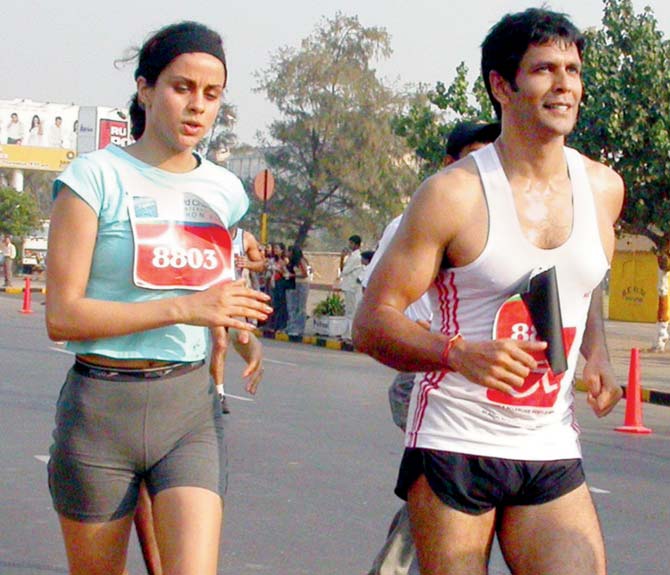
Milind Soman
When I was younger, I disliked running. I was a swimmer and was a national level athlete. However, swimming was something I
stopped doing regularly when I was 23 years old, around the time I took up modelling.
When I was 38 years old, I took up running and that changed my life.
The marathon -- because of its history -- was a mythical concept in my head, something I knew as a child that I wanted to
attempt once in my life. So, when in 2003, the Standard Chartered Mumbai Marathon was announced (for the year 2004), I knew I had to participate. After all, it was an event that was happening in my city. I prepared for it for a few months and ran the
half marathon. Suffice to say, I was hooked.
After that, I went on to do the full marathon, several city-to-city runs and then, last year I participated in the Ironman --
which is a triathlon. Next, I am training for the Ultraman which will be conducted in Florida in February.
I feel most like myself when I run. I feel one with the Universe. At the most basic level, you feel in control of yourself and you feel like you are in the right place.
Swimming has now taken a backseat. I now swim once or twice a year, but when I do, it's long distances. I enjoy running more.
- Gitanjali Chandrasekharan
Dr Bhushan Mahadik, research scientist, University of Illinois
'At the science centre, I grew attracted to the cosmic world'
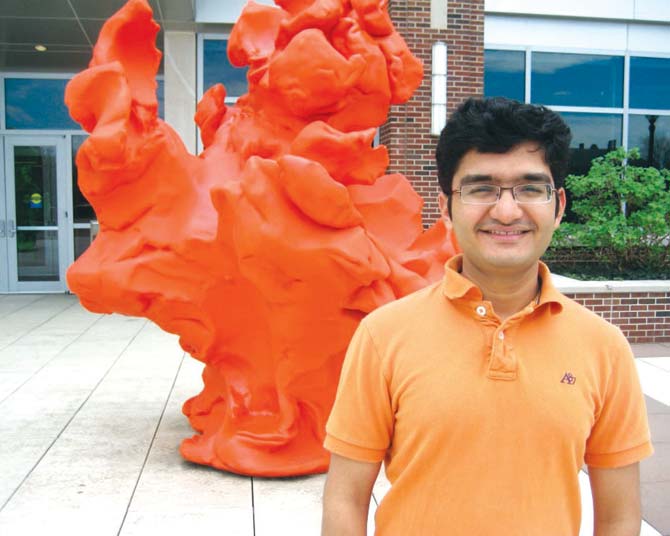 Bhushan Mahadik in 2012 outside Dr Harly’s Lab where he is a research associate
Bhushan Mahadik in 2012 outside Dr Harly’s Lab where he is a research associate
My parents Prakash (64) and Kaveri (61), would make it a point to make me visit the Nehru Science Centre at Worli almost every week since I was in Class 6. Unlike other students, I would head straight to the science centre and it was here that I started getting attracted towards the cosmic world. The more I visited the centre, the more I got attracted to the cosmic world.
The experience was fascinating. As a child I could understand more about different exhibits displayed at the centre and the
underlying engineering principles that made it work. Also, scientific phenomenon, were explained in details by the officials
at the centres.
The more they (Centre officials) answered my Hows and Whys, the more I'd get excited and be encouraged to clear more doubts, which would simplify and help me understand the concepts better. That was a good starting point.
I had a similar experience at the Nehru Planetarium, close to the centre, where I would get fascinated with stars and the
galaxy. In 2001, as a Class 10 student, I participated and won the prestigious Intel International Science and Engineering
Fair Award organised by Intel Inc, held at Ohio, Cleveland. I won the fourth prize and was among the six students selected
from India. My area of research was 'Synthesis of Carbon nano tubes' and I am thankful to Professor Dr Maheshwar Sharon, at
IIT, Powai, who guided me through out.
Vinod Kumar Menon
Tanmay Bhat, co-founder, AIB
'Johnny Lever helped me find my calling'
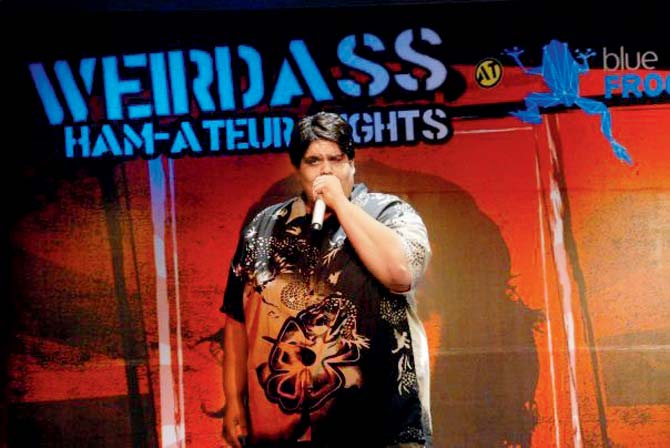
Bhat’s first open mic at blueFrog (2011)
Being a chubby kid often meant working harder to not be bullied, or be made fun of. I was always the class clown, and I
enjoyed being the one that was liked by all -- teachers and students alike. I remember taking part in school debates and
realising I enjoyed being on stage a lot. But, I think it all took a definite turn for me, when I first discovered Johnny
Lever, through one of his stand-up cassettes. I must have been 11 or 12 years at that time. I was so taken in by it all, that
I started taping my voice over his lines. I learnt his entire routine by heart and would replicate it word to word.
Obsessively. We used to travel around in a family car often, that's where I would make everyone listen to the jokes, on tape.
Then, one Republic Day, there was a building function going on. I gathered all my courage and asked the organisers to allow me
five minutes' time on stage. I was on. For the next 20 minutes I released all the Johnny Lever jokes in me and killed it. You
could say, that was my first successful outing.
Through Johnny Lever, I discovered a host of comedians; Jimmy Moses (Johnny's brother) was one them. Much later in life, I saw Rohan Joshi's Gtalk status update one day, that said, “Just did stand-up for the first time in life -- ticked off my bucket
list”. I couldn't resist and I hit him up. I was writing for television at that time, but I really wanted to try out a stand-
up gig on a big stage. The next week, I was performing at an open mic organised by Vir Das at Blue Frog.
I slayed again. Thereon, it was addictive. I was extremely nervous the first time, as a child, and even now, it's the same. I think a lot of comics have one thing in common -- the need for validation. Although, I also believe that to re-invent yourself, you need to let go of that need (for validation) and do something that scares you from time to time.
- Kusumita Das
Cheteshwar Pujara, batsman
'My inner strength comes from my daily prayers'
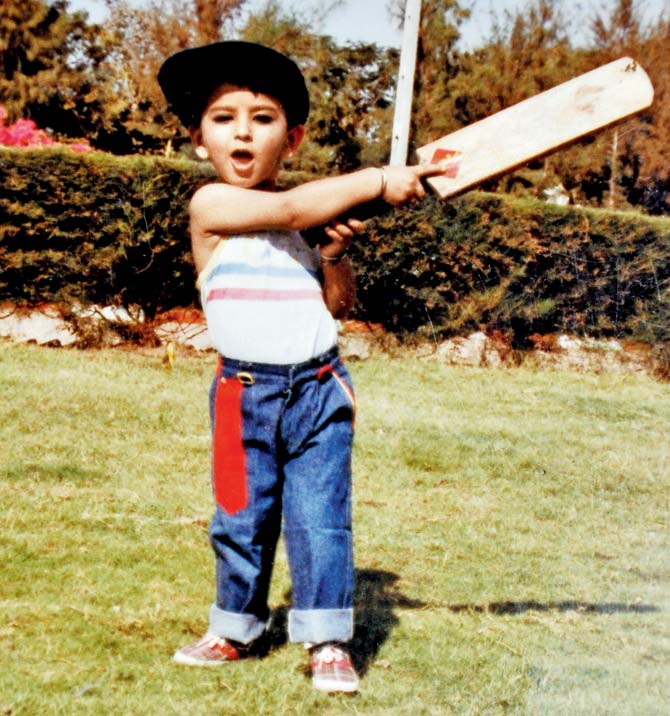
A three-year-old Cheteshwar Pujara at his Rajkot residence
When you are successful, people praise you and when you are not, they criticise. I have learnt to take these things in my
stride because I am confident about my game and I know what I am doing. I didn't think I was out of form even when I wasn't
scoring big. If you see my innings during that period, you will notice that I always got the start, but I wasn't able to
convert those starts to big hundreds.
But, I was always confident and I knew that it was just a matter of time before the runs start flowing again. I am a very
positive person and that's the reason why I have always come back strongly, be it from bad form or injury.
This confidence comes from my inner strength, and my inner strength comes from my daily prayers, a habit instilled in me by my late mother Reena Ben when I was young. I was very fond of video games and used to spend a lot of time on that, so my mom put a condition that I would be able to play only if I pray for half an hour. Dad didn't like this blackmail but mom was adamant that it would stand me in good stead in future. Now, I spend some time doing my daily rituals without fail every day.
If it's my calmness, patience and determination that people talk as my strengths, I owe everything to my mother. My mom wanted to see me play for India some day. But she lost her battle against cancer even before I made my Ranji debut. If I have been able to overcome the sadness of my mom's death, frequent setbacks due to on-field injuries and still perform, it is all
because of my mental strength.
- Ajit Bezbaruah
Ankur Tiwari, musician
'In India, it is better to be served, than serve'
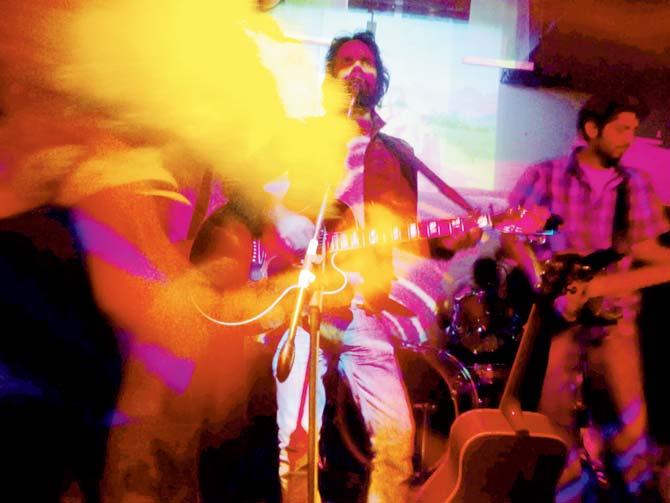
Ankur Tiwari during a gig at Zenzi in 2008
In 1997, I was in Bhopal studying hotel management, and the final exams were nearing. I knew I was just wasting my time,
because I had slowly realised that this was not what I was meant to do. I would spend all my time in the cafeteria singing. As
the exams neared, I started getting a nagging thought -- that music couldn't be my Plan B. But, I still went for my training at
a five-star hotel in Delhi, and that's when the final breaking point occurred.
We Indians don't treat our service class with the respect that they deserve. It was then I realised that it was better being
served, than to serve. So, I quit hotel management, and didn't even give my final exams. I shifted to Mumbai in 1998, with an
optimistic mind-set. I thought that I would come here, and would cut my album right away. It took me 10 years to do that
though! But that time was great. I remember playing at the hotspot back then, Zenzi. It was a packed night. I actually thought
as if the audience and the band was a giant amoeba -- we were all one. Later, we also became the first Hindi band to play at
blueFROG. One thing hasn't changed since -- I was optimistic then, and am optimistic now.
Aastha Atray Banan
Santosh Kambli, sculptor, Lal Baugcha Raja
'People would spit after giving me water'
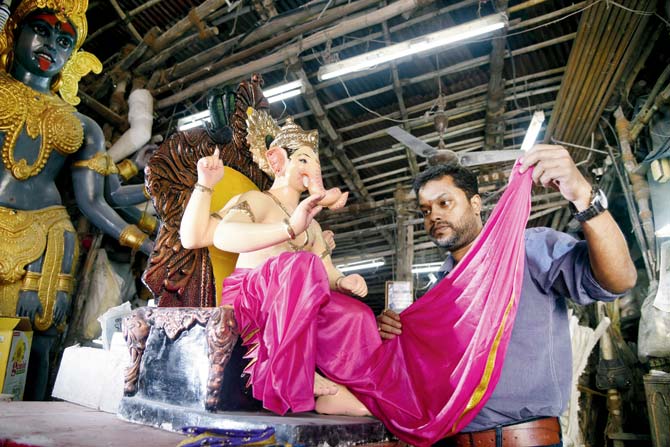
Santosh Kambli puts the finishing touches on a Ganpati sculpture. Pic/Sameer Markande
All throughout 2000 to 2002, I worked as a courier boy at a bank. I would get extremely thirsty running around, and would ask
for water at the nearby houses. They would give me a glass of water and then spit on the side, as a sign of washing away the
impurity that I was. From running away crying to now being globally recognised, I owe everything to the day when I took a leap
of faith, entered the workshop, and felt the clay in my hand.
My grandfather, uncle and father were all JJ School of Art's graduates. I, on the other hand, dropped out of Standard 12 due
to family problems. Though I was fascinated by the way they created beautiful things, I never wanted to do that myself. It's
only after I entered the workshop, observed things closely, that I felt why not? At 26, I started visiting the workshop to
give my father food, supplies, etc; I don't know if it was Bappa's presence or my wish to devote myself completely to him, but
I suddenly had an unreal feeling of knowing where I belonged. The decision was made, and for the next three years, I slept,
ate, drank and breathed only Ganpati. I couldn't see anything else, that was his power. Today, after having my idols shipped
to countries like USA, UK, Switzerland, Holland, Canada, Mauritius and South Africa, I don't feel regret about what I worked
as, because it has kept me grounded. Today, when a boy comes to the doorstep for water, I never turn him away.
Aparna Shukla
 Subscribe today by clicking the link and stay updated with the latest news!" Click here!
Subscribe today by clicking the link and stay updated with the latest news!" Click here!






